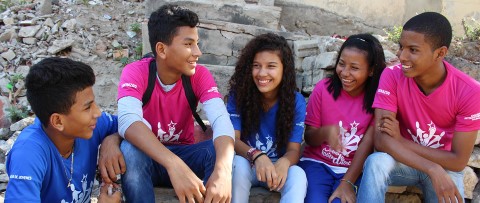- Team Impact
- Dominican Republic
Empowering young leaders.
Transforming futures.
Transforming futures.

The world that teenagers all over the world grow up in today is in stark contrast to that of their parents or grandparents. This may be especially true in developing countries.
Compared with teens of past generations, there are more inherent challenges baked into cultures all over the world. Even in poor countries, where many Children International offices are located, teens are exposed to media that encourages risky behaviors at a young age.
There’s little doubt the transition from childhood to adulthood can be one of life’s first big challenges. Think back to your teen years — cringe-worthy at times, right? Navigating changes in our bodies and minds in a landscape that’s filled with seemingly endless temptations can feel overwhelming and tough to manage. For teens in poverty, the threats are numerous and their mistakes can have consequences that make it harder to break the cycle of poverty.
Granted, these issues can be challenges for teens in the U.S. too, but, in many of the locations where Children International youth live, there are often cultural or social taboos at play that can discourage speaking frankly and sharing information with family and friends. Things like patriarchal and male-centered attitudes, rooted in both cultural practices and sometimes religious interpretations can also be a constraint.
To make progress, we need to understand how to navigate these nuances and learn how to discuss these issues openly. That’s where our youth wellness program makes such an important difference. It provides valuable information on a number of complicated topics adolescents living in poverty face daily, with a particular focus on reproductive health and substance abuse.
By addressing specific needs that vary by location, as well as providing accurate information around these tough topics, we’re educating teens to make healthy lifestyle choices and giving them essential skills that will last a lifetime.

We know how important it is to create an open dialogue with teens about these issues. That’s why our program emphasizes the positive benefits of changing unhealthy behaviors and encourages youth to share their newfound knowledge with friends and family. Additionally, our staff conducts interactive workshops and group activities that help teens gain confidence to not only make smart decisions, but to spread the word about what they’ve learned throughout their entire communities.
251,931 peer contacts
Trained teens are spreading the word about healthy lifestyles to their peers.
“On a few occasions, I have been requested by my teachers to come up and explain to the class certain girl and female issues. I also spoke to my friends and peers about it and de-mystified some of the common tales with the more scientific ones.”

We break down the process of learning healthy behaviors into five steps. Let’s use smoking as an example:

It all comes down to the fact that a lack of knowledge is a major contributor to negative health outcomes in poor communities. Teens don’t know better until they’ve learned better. Your support helps make it possible for our staff in the field to deliver this knowledge to youth in ways that make sense for them and can resonate on levels that help them retain the information.
Comments
You must be logged in to comment. If you have an account, click here to log in.